 After
years of dizziness/nausea, it was found that inner ear issues were
not the
problem. All along I had a cancerous brain tumor in
the posterior fossa region. I was also found to have spinal cancer.
After
years of dizziness/nausea, it was found that inner ear issues were
not the
problem. All along I had a cancerous brain tumor in
the posterior fossa region. I was also found to have spinal cancer. 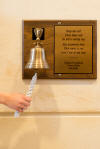 Radiation
Therapy BELL, University of Oklahoma, Oncology Hospital
Radiation
Therapy BELL, University of Oklahoma, Oncology HospitalEpendymoma Brain Cancer
Misdiagnosis of Ependymoma as BPPV or Benign paroxysmal positional vertigo
I visited an MD who ran many blood tests for different things that he suspected could be wrong (diabetes, iron anemia, others). All the requested blood work was associated with my having lived and worked in Central America, prior to moving back to the US. But, nothing came back as being a problem. Also, I had several EKG's and none of what they tested for came back positive. I also had a CAT SCAN of my brain, but they too found nothing. It got so bad that it was really hard to work. Finally I went to an ear doctor who prescribed "valium" which at the time saved me. Without it, I was completely immobilized. He suspected that some brain injuries resulted in this kind of nausea, but admittedly did not know. I had rolled my pickup in an ice accident 6-months earlier, and hit my head on the inside of the pickup, but never really encountered any pain, excluding having a stiff neck for a while.
Via several ear clinics, and several different people performing the test, I was diagnosed with BPPV or benign paroxysmal vertigo. I subsequently went through months and months of the exercises that were prescribed to fix BPPV (Dix-Hallpike procedure, Epley Maneuver, Semont Maneuver, and the modified Epley Maneuver). All of this just made everything worse. During much of this time period, I was on valium (3, 3mg pills/day). The ENT was concerned about the valium, so over about 2-3 weeks he decided to wean me off the valium. This then made things much worse. On the weekends I wouldn't leave the bedroom, trying to rest so I could go to work on Monday. I do remember that this is the worst I have felt in my entire life. The nausea and dizziness were to a point that became unbearable. Following 3-4 days of being completely immobilized, my wife went to the ENT and asked if he could put me back on valium which he did, and that made things at least tolerable.
During this time, I read as much as I could on the web, and elsewhere, for as long as I could stand sitting up because at this point I was losing hope. I read really awful accounts of people who hadn't worked for years because of their incurable BPPV. Finally, I found an MD in Detroit MI, who performed inner-ear surgery to correct for BPPV that is called Posterior Semicircular Canal Occlusion. I called them and told them I had been diagnosed twice, 2 different clinics, for BPPV, but none of the physical therapy maneuvers worked. They suggested surgery, but I needed to fly to Detroit and get diagnosed again. So I flew to Detroit, and was again diagnosed with BPPV (visible nystagmus once the Epley procedure was performed, and was scheduled for surgery the morning of December 24th). Following a December 23 office visit and confirmed BPPV prognosis, I asked the MD if they could run an MRI, just to make sure it wasn't something else, and he indicated they could, but that he was sure I needed the Canal Occlusion surgery. So, on short notice they were able to schedule an MRI at a hospital across town. In a snow blizzard, I took a cab to this hospital where I was able to get an MRI the evening of the 23rd. The radiologist found a brain tumor in the posterior fossa region (image below). The MD that was going to perform the Canal Occlusion surgery the next morning was informed of these results, and to his credit made it to the hospital to inform me of the brain tumor. What a shock to find this out after 3 years of battling dizziness and nausea.
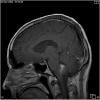 December 23, 2008 MRI
December 23, 2008 MRISo the inner ear MD in Detroit cancelled the December 24th surgery, and I immediately tried to get home. The continuing snowstorm on the 24th made this an adventure in itself as I took a train to Chicago (took 15 hours). All planned connections for all travelers were completely messed up. Seemingly stuck in a hotel in Chicago, on Christmas day, I went to the Chicago-Midway airport at 4 in the morning and luckily found a seat on a flight to OKC. The best Christmas I've ever spent was that day I made it home.
Radiation and post radiation was awful. Nausea, vomiting, and a total lack of any kind of energy were the norm. It is almost like having a gas tank that has nothing in it, and when you spend just a little bit of energy you get physically sick, and more so if you over do it just a bit. Energy expenditure must be done in very gauged amounts. Whole brain radiation also affected my tongue and taste. Nothing tasted good, excluding milk. Chocolate malts tasted good, but nothing else. I lost a lot of weight simply because everything tasted so bad. This lasted more than 6 months. Energy levels are still less than 80% of what they were almost 2 years later.
Radiation Treatment: You will get fitted with a mask/body mold depending on how much radiation (areas) you will be getting. Mine went all the way past my lower chest. See site below for added insight.
Enduring sometimes one hour (whole brain, whole body) radiation under this mask where frankly you cannot swallow was awful. If you are closterphobic, it is even worse. No movement of any kind was possible, because you are basically bolted to a sled. And if your surgery was in the back of the head (where mine was) it is also very painful. I said a lot of Rosaries and this helped a lot.
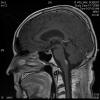 July 17, 2009 MRI
July 17, 2009 MRI Image for July 17, shows remaining tumor on the brain stem. Surgery date was 6 months earlier, January 16. It took more than a year before I got some resemblance of energy back. For the first 5-6 months, there just wasn't any energy there. Radiation recovery just takes a lot of time. Radiation burn and scar from brain tumor surgery are also shown.
MRI Results, April 2009
MRI Results, October 2009
The April 2010 MRI noted that the tumor on the brain stem had not grown, but was still present.
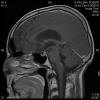 October 9, 2010
October 9, 2010MRI Results, October 2010
October 2010 MRI looks good (report above). Tumor on the brain stem is still present but hasn't grown. Was cleared for another 6 months when they will again obtain a full body MRI (April 2011)
My eyes have never really recovered. Post surgery I saw double for around 4 months, and wore an eye patch. Balance and vision issues are apparently common when tumors are in the posterior fossa region. Now, my eyes can be steady, but you have to hold your head really still. Balance has been a mess since surgery, but as the oncologist said, "this is now the way you are." I exercise daily, I ride my bike to work which can be a bit scary (round trip is 6 miles), but I'm pushing my eyes and balance. Leg strength via the bike riding has really helped me stand still without wobbling, even though my eyes are still dizzy.
Post surgery, I saw a neuro ophthalmologist and he prescribed a couple of different drugs (baclofen was one), but none of this really helped. Getting my brain to re-wire (term my oncologist used) has been interesting. I would not say that post-surgery it has improved much, but rather that my ability to deal with the double vision has pushed the problem off to the side. Shut one eye, most all the time, and you can find your way.
MRI Results, April 2011
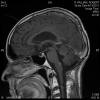
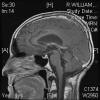
First time I have gone 1 year since having previous MRI. Eyes have gotten a bit worse over the last year. When I move my head, even slowly, left and right, things get really dizzy. Setting my head in one position for 20-30 seconds will slow things down and vision will settle. Double vision happens with rapid head movement.

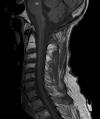
Have ridden my bike to work everyday for the last 2 years. This is a 6 mile round trip. Riding the bike is easier than walking since it is a level-gyroscope type motion. Exercise every morning, simple weights, and take vitamins 5-7 days/week.
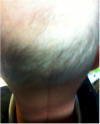 Scar from Brain Surgery, 4 years later
Scar from Brain Surgery, 4 years laterLINKS
Posterior fossa tumor masquerading as anterior canal BPPV
Adult Ependymoma
Treatment of acquired nystagmus
(see example site).

What Can I Share?
1. Pray as you never prayed before and ask God to pull you through it. It will give you strength to deal with the impossible if you know that “God is on your side”.
2. I am thankful to be a Catholic and for the appreciation I have for God in the smallest of things to the largest. My son reminded me to be grateful to God for water and soap to wash our hands. Little stuff always ends up being big stuff.
3. Cancer has been a gift.
I’m no example of anything special, nor has my life been remotely
exemplary. But this gift has
allowed me to communicate with the CCD classes I teach in ways
that would not have been possible before.
My cousin’s son died of a
Glioblastoma
multiforme brain tumor at the age of 13.
Before
Nathan died, he taught me and so many others that it is our troubles
that will make us stronger. And
while I’ve been given the 2nd chance that Nathan wasn’t, his
story has been shared with countless numbers of Catholic 5th graders who
now better understand their faith.
4. In seeking wisdom, find somebody who has suffered.
5.
Get as much rest as absolutely possible, especially post radiation
6.
Take lots of vitamins
7.
Many other cancer patients have told me to eat
a lot of berries (all kinds).
Basically lots of anti oxidants
8.
Drink lots of milk
9. Radiation was the worst. Once you get past 6 months (post radiation), things improve. Nonetheless, years later, I still don't have much energy. After a while you accept that "this is now the way you are."
10.
Exercise of any kind that you can tolerate
11.
You have to rely on others to help.
My wife, father in-law, mother in-law, cousin, and all our 4 kids were frankly
fantastic. All the people I work
with, really all over the world have been awesome.
Bill,
Daily I've been wondering how you are doing. While I don't know the details, what I've heard indicates a battle. I include you in my prayers and hope treatment is successful.
You are a giant repesenting so much more than professionalism and science for me. Thoughtfulness, selflessness, devotion, driven, passionate, and yet still very kind..... what an amazing combination of traits. When I grow up, I want to be like you.
Best wishes,
Newell
--------------------------
Soon after surgery, Jim Schepers immediately sent me a check for $1000 to help with expenses. That check along with Newell Kitchen's letter is framed above my desk. Family takes on different meanings when things like this happen. Thanks Jim, and thanks Newell!
